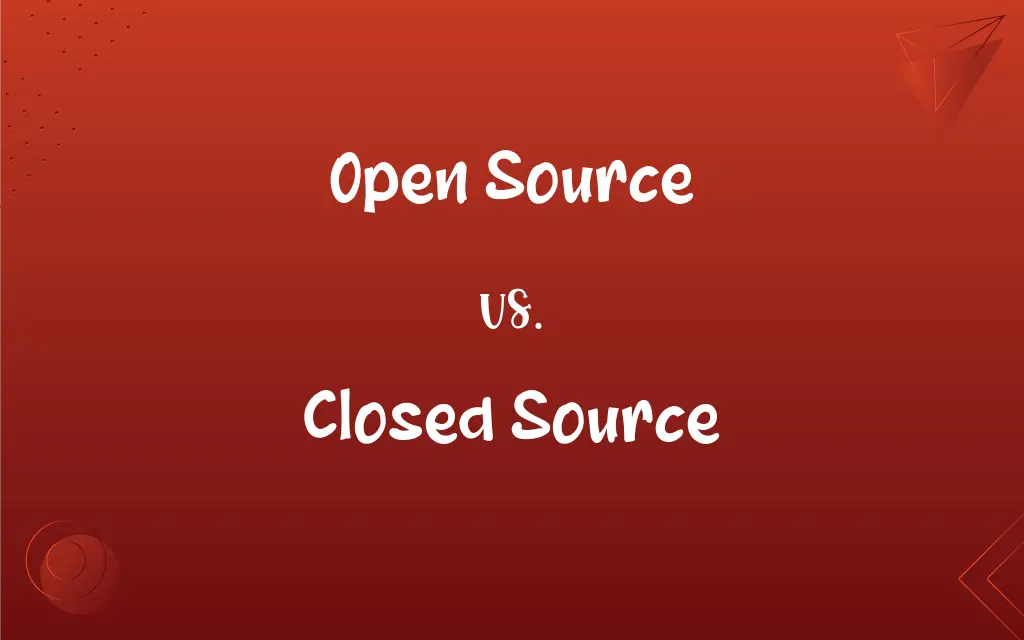Open Source vs. Closed Source: What's the Difference?
Edited by Aimie Carlson || By Harlon Moss || Updated on November 18, 2023
Open Source is a software with source code accessible and modifiable by anyone. Closed Source is a software with proprietary code, not openly accessible or modifiable.

Key Differences
Open source software allows users to freely access, modify, and distribute its source code. This promotes collaboration and innovation. Closed source software, also known as proprietary software, keeps its source code private, accessible only to the original developers or the company.
Open source projects often have large, collaborative communities contributing to their development. These projects can evolve rapidly due to diverse contributions. Closed source software is developed and maintained by a specific company or group of developers, with limited external input.
Licensing in open source software typically allows for modification and redistribution, fostering a shared and community-driven approach. Closed source software, on the other hand, comes with restrictive licenses that limit how it can be used, modified, or distributed.
Open source software can be more secure due to its transparency and the potential for many eyes to review and fix issues. Closed source software, while controlled, relies on a smaller team for security and may not reveal vulnerabilities publicly.
Open source projects can be cost-effective as they are often free or low-cost, making them accessible to a wider audience. Closed source software usually requires purchasing licenses or subscriptions, potentially making it more expensive.
ADVERTISEMENT
Comparison Chart
Source Code Access
Accessible and modifiable by all
Restricted and not modifiable
Development Approach
Collaborative and community-driven
Developed by specific teams
Licensing
Permissive, allowing redistribution
Restrictive, limiting usage
Security
Potentially more secure due to transparency
Security reliant on fewer developers
Cost
Often free or low-cost
Typically requires purchase or subscription
ADVERTISEMENT
Open Source and Closed Source Definitions
Open Source
Software developed with community participation and contribution.
Many open source projects thrive on contributions from developers worldwide.
Closed Source
Software developed and controlled by a specific organization.
Their closed source tool was maintained by a dedicated team of developers.
Open Source
Software that often uses permissive licenses.
The open source license allowed her to modify the code for her needs.
Closed Source
Software that usually requires purchasing a license.
She bought a license for the closed source graphic design software.
Open Source
Software that grants users the freedom to study, change, and share.
He preferred open source software for its flexibility and transparency.
Closed Source
Software with proprietary code that's not freely accessible or modifiable.
Microsoft Office is an example of closed source software.
Open Source
Software with a publicly accessible codebase.
Open source platforms like GitHub host numerous open source projects.
Closed Source
Software where the source code is kept confidential.
The company developed its application as closed source to protect its intellectual property.
Open Source
Software whose source code is available for modification and distribution.
Linux is a popular open source operating system.
Closed Source
Software with restricted user permissions regarding modification.
In the closed source program, he couldn't alter the underlying code.
Open Source
Open to public participation, as in the sharing of information or the development of software
An open-source operating system.
Closed Source
Whose constituent makeup, or source code, is not made publicly available.
Open Source
(software) Of or relating to a product which is licensed to permit modifications and redistribution of its source code, as per [https://opensource.org/osd The Open Source Definition].
Linux is an open-source operating system.
Open Source
(by extension) Describing any product whose composition or method of manufacturing is public knowledge and not proprietary.
Open-source cola
Open Source
(espionage) Relying on publicly available information (open sources).
Open-source intelligence
Open Source
(transitive) To release the source code of.
Open Source
Of or relating to or being computer software for which the source code is freely available
FAQs
What’s the main advantage of open source software?
Its collaborative nature and the ability to modify the code.
Can closed source software be customized?
It’s limited, as the source code is not accessible for modifications.
Can you make money from open source software?
Yes, through services like support, customization, and hosting.
Why do companies choose open source software?
For its flexibility, cost-effectiveness, and community support.
Is open source software always free?
Mostly, but some open source projects may charge for additional services.
Is it easier to find bugs in open source software?
Yes, due to its transparency and the community reviewing the code.
Can closed source software be more secure than open source?
It depends, but open source can have better security due to public scrutiny.
Can you sell open source software?
Selling is possible, but the code itself remains free to modify and distribute.
Are open source projects always collaborative?
Typically, but the level of collaboration varies by project.
Do governments use open source software?
Many governments use and even mandate open source software for transparency.
Is documentation better in closed source software?
Not necessarily, as many open source projects have robust documentation.
Do closed source products offer better customer support?
Often yes, as support is provided by the proprietary company.
Why do some companies prefer closed source software?
For control over the product and to protect intellectual property.
Can using closed source software lead to vendor lock-in?
Yes, as it may depend heavily on a single vendor's ecosystem.
Are there hybrid models combining open and closed source?
Yes, some projects combine open source foundations with proprietary elements.
Can open source software be less user-friendly?
Sometimes, as user experience might be secondary to functionality.
Can closed source software limit innovation?
It might, due to restrictions on code accessibility and modification.
How does open source software benefit education?
It provides accessible tools for learning and experimentation.
Do companies contribute to open source projects?
Yes, many companies actively contribute to and sponsor open source projects.
Is it harder to maintain open source software?
Maintenance can be challenging but is aided by community contributions.
About Author
Written by
Harlon MossHarlon is a seasoned quality moderator and accomplished content writer for Difference Wiki. An alumnus of the prestigious University of California, he earned his degree in Computer Science. Leveraging his academic background, Harlon brings a meticulous and informed perspective to his work, ensuring content accuracy and excellence.
Edited by
Aimie CarlsonAimie Carlson, holding a master's degree in English literature, is a fervent English language enthusiast. She lends her writing talents to Difference Wiki, a prominent website that specializes in comparisons, offering readers insightful analyses that both captivate and inform.































































